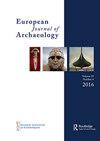Lynchet-Type Terraces, Loess, and Agricultural Resilience on Chalk Landscapes in the UK and Belgium
IF 1.4
2区 历史学
0 ARCHAEOLOGY
引用次数: 0
Abstract
Lynchets, often the defining component of historic agricultural landscapes in northern Europe, are generally associated with soft-limestone geologies and are particularly well developed on loess-mantled landscapes. To understand their formation and chronology, the authors present their geoarchaeological analyses of lynchet soils and loess deposits at Blick Mead and Charlton Forest in southern England, and Sint Martens-Voeren in Belgium. The lynchets date from the late prehistoric to the medieval periods and were constructed by plough action at the English sites, and by both cut-and-fill and ploughing in Belgium. This has resulted in the preservation of highly fertile loessic soils across chalk slopes, lost elsewhere. Although each example is associated with local/regional agricultural histories, the lynchets’ effective soil-retention capacities allowed them to survive as important heritage features with environmental benefits over millennia.英国和比利时白垩地貌上的林斧型梯田、黄土和农业恢复力
猞猁通常是北欧历史农业景观的重要组成部分,一般与软质石灰岩地质有关,在黄土覆盖的地貌上尤为发达。为了了解它们的形成和年代,作者介绍了他们在英格兰南部的布里克米德和查尔顿森林以及比利时的圣马滕斯-沃伦(Sint Martens-Voeren)对猞猁土和黄土沉积物进行的地质考古分析。这些陵墓的历史可追溯到史前晚期至中世纪,在英格兰的陵墓是通过犁耕建造的,在比利时则是通过挖填和犁耕建造的。这使得白垩坡上非常肥沃的黄土得以保留,而其他地方的黄土已经消失。尽管每个例子都与当地/区域的农业历史有关,但犁沟有效的土壤保持能力使其得以保存下来,成为重要的遗产特征,千百年来为环境带来益处。
本文章由计算机程序翻译,如有差异,请以英文原文为准。
求助全文
约1分钟内获得全文
求助全文
来源期刊

European Journal of Archaeology
ARCHAEOLOGY-
CiteScore
3.40
自引率
6.70%
发文量
58
期刊介绍:
The publication organ of the European Association of Archaeologists, the European Journal of Archaeology seeks to promote open debate amongst archaeologists committed to a new idea of Europe in which there is more communication across national frontiers and more interest in interpretation. The journal accepts not only new empirical data and new interpretations of the past but also encourages debate about the role archaeology plays in society, how it should be organized in a changing Europe, and the ethics of archaeological practice. All periods are covered; papers, review articles, interviews and short "debate" pieces are all sought. Whilst English is the primary language of publication in the EJA, papers submitted in French or German will be given equal consideration.
 求助内容:
求助内容: 应助结果提醒方式:
应助结果提醒方式:


